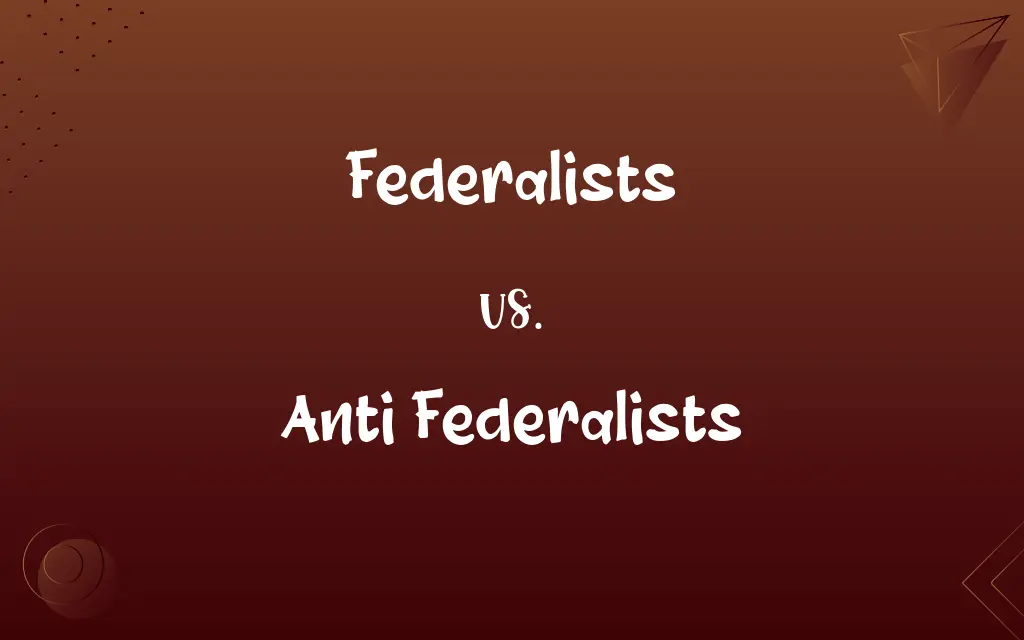Federalists vs. Anti Federalists: Know the Difference

By Shumaila Saeed || Updated on December 25, 2023
Federalists supported a strong central government and the U.S. Constitution; Anti-Federalists favored state sovereignty and opposed the Constitution's centralizing aspects.

Key Differences
Federalists advocated for a strong national government to ensure order and stability in the newly formed United States. Anti-Federalists, conversely, feared that such a government would overpower state rights and individual freedoms, preferring more power to be retained by states.
Shumaila Saeed
Dec 19, 2023
The Federalists were instrumental in the drafting and ratification of the U.S. Constitution, believing it necessary for a unified nation. Anti-Federalists opposed the Constitution without a Bill of Rights, concerned about potential tyranny and the loss of personal liberties.
Shumaila Saeed
Dec 19, 2023
Federalists, such as Alexander Hamilton, argued that a strong centralized government was essential for economic development and international respect. Anti-Federalists, like Patrick Henry, argued that this would lead to corruption and the erosion of democratic principles.
Shumaila Saeed
Dec 19, 2023
In terms of economic vision, Federalists supported a commercial and industrial economy with a national bank. Anti-Federalists favored an agrarian economy and were wary of national financial institutions, fearing centralized control over the economy.
Shumaila Saeed
Dec 19, 2023
Federalists were typically well-organized and included many of the Founding Fathers and influential figures of early American politics. Anti-Federalists were more diverse, including farmers and individuals wary of distant, centralized authority.
Shumaila Saeed
Dec 19, 2023
ADVERTISEMENT
Comparison Chart
View on Central Government
Supported a strong central government
Favored state sovereignty
Shumaila Saeed
Dec 19, 2023
Stance on U.S. Constitution
Advocated for ratification
Opposed without a Bill of Rights
Shumaila Saeed
Dec 19, 2023
Economic Vision
Preferred a commercial, industrial economy
Favored an agrarian economy
Shumaila Saeed
Dec 19, 2023
View on National Bank
Supported the creation of a national bank
Wary of centralized financial control
Shumaila Saeed
Dec 19, 2023
ADVERTISEMENT
Federalists and Anti Federalists Definitions
Federalists
Federalists supported commercial and industrial development.
Federalists believed in the importance of a national bank for economic growth.
Shumaila Saeed
Dec 11, 2023
Anti Federalists
Anti-Federalists favored an agrarian-based economy.
Anti-Federalists were concerned about the industrial and financial focus of Federalists.
Shumaila Saeed
Dec 11, 2023
Federalists
They advocated for the ratification of the U.S. Constitution.
Federalists argued that the Constitution was crucial for national unity.
Shumaila Saeed
Dec 11, 2023
Anti Federalists
They were diverse, representing various social classes.
Anti-Federalists included many farmers and lower-class citizens.
Shumaila Saeed
Dec 11, 2023
Federalists
They were often the political elite in early American society.
Many Federalists were influential figures in early American politics.
Shumaila Saeed
Dec 11, 2023
ADVERTISEMENT
Anti Federalists
Anti-Federalists opposed a strong central government in the U.S.
Anti-Federalists feared the loss of state autonomy under a strong central government.
Shumaila Saeed
Dec 11, 2023
Federalists
Federalists emphasized strong federal authority over states.
Federalists argued that a strong central government was essential for progress.
Shumaila Saeed
Dec 11, 2023
Anti Federalists
Anti-Federalists emphasized local and state governance.
Anti-Federalists believed in the importance of maintaining state powers and rights.
Shumaila Saeed
Dec 11, 2023
Federalists
Federalists were proponents of a strong national government in early U.S. history.
Federalists played a key role in establishing the U.S. financial system.
Shumaila Saeed
Dec 11, 2023
Anti Federalists
They demanded a Bill of Rights in the Constitution.
Anti-Federalists fought for the inclusion of the Bill of Rights to protect individual liberties.
Shumaila Saeed
Dec 11, 2023
Repeatedly Asked Queries
Name some notable Anti-Federalists.
Patrick Henry and George Mason were influential Anti-Federalists.
Shumaila Saeed
Dec 19, 2023
Who were some prominent Federalist leaders?
Prominent Federalist leaders included Alexander Hamilton, John Adams, and John Jay.
Shumaila Saeed
Dec 19, 2023
What was the Federalist Papers?
The Federalist Papers were a series of essays written by Hamilton, Madison, and Jay to promote the ratification of the U.S. Constitution.
Shumaila Saeed
Dec 19, 2023
When did the Anti-Federalist movement emerge?
The Anti-Federalist movement emerged during the same period as the Federalists, mainly during the ratification debates of the U.S. Constitution.
Shumaila Saeed
Dec 19, 2023
What were Federalists' main beliefs?
They believed in a strong central government and ratifying the U.S. Constitution.
Shumaila Saeed
Dec 19, 2023
What were the key beliefs of the Federalists?
Federalists believed in a strong national government, a centralized banking system, and a loose interpretation of the Constitution.
Shumaila Saeed
Dec 19, 2023
What did Anti-Federalists advocate for?
They advocated for state sovereignty and opposed centralizing aspects of the Constitution.
Shumaila Saeed
Dec 19, 2023
Who were prominent Federalists?
Alexander Hamilton and John Adams were key Federalist figures.
Shumaila Saeed
Dec 19, 2023
Who were the Anti-Federalists?
Anti-Federalists were a group of early American political leaders and individuals who opposed the ratification of the U.S. Constitution.
Shumaila Saeed
Dec 19, 2023
Are there any modern political movements that align with Federalist or Anti-Federalist principles?
Some political movements today may align with aspects of Federalist or Anti-Federalist principles, depending on their stance on government power and individual rights.
Shumaila Saeed
Dec 19, 2023
How did the Federalist-Anti-Federalist debates shape the early American political landscape?
These debates helped shape the structure of the U.S. government and established important principles of federalism and limited government.
Shumaila Saeed
Dec 19, 2023
What were the key beliefs of the Anti-Federalists?
Anti-Federalists believed in strong state governments, feared a centralized government, and wanted a strict interpretation of the Constitution.
Shumaila Saeed
Dec 19, 2023
What were the Anti-Federalists' main objections to the Constitution?
Anti-Federalists were concerned about the lack of a Bill of Rights, the potential for an oppressive central government, and the absence of specific protections for individual liberties.
Shumaila Saeed
Dec 19, 2023
Did any Federalist or Anti-Federalist leaders become U.S. Presidents?
Yes, John Adams and Thomas Jefferson, both of whom had differing views during the Federalist-Anti-Federalist debates, became U.S. Presidents.
Shumaila Saeed
Dec 19, 2023
Who were some prominent Anti-Federalist leaders?
Prominent Anti-Federalist leaders included Patrick Henry, George Mason, and Thomas Jefferson.
Shumaila Saeed
Dec 19, 2023
What political party did the Federalists evolve into?
The Federalist Party evolved into the Federalist-Republican Party and later into the modern Democratic-Republican Party.
Shumaila Saeed
Dec 19, 2023
What is the relevance of Federalist and Anti-Federalist ideas in modern politics?
Federalist and Anti-Federalist ideas continue to influence debates about the scope of federal government power and individual rights in the United States.
Shumaila Saeed
Dec 19, 2023
Did any Anti-Federalist arguments find their way into the U.S. Constitution?
Yes, some Anti-Federalist concerns influenced the addition of the Bill of Rights, which guarantees individual liberties.
Shumaila Saeed
Dec 19, 2023
Share this page
Link for your blog / website
HTML
Link to share via messenger
About Author
Written by
Shumaila SaeedShumaila Saeed, an expert content creator with 6 years of experience, specializes in distilling complex topics into easily digestible comparisons, shining a light on the nuances that both inform and educate readers with clarity and accuracy.









































































